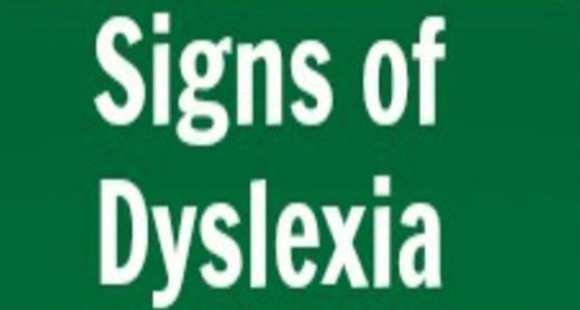How do we address the signs of children with dyslexia?

Before we can resolve a medical condition, we have to bring awareness to it. October is the National Dyslexia Awareness Month. Dyslexia is a neurological disorder that causes the brain to process and interpret information differently. Almost 20 percent of the U.S. population is diagnosed with this language-based learning disability. The disability is characterized by difficulties with word recognition, poor spelling and decoding abilities. For people who are born with dyslexia, it is a lifelong challenge. Considering the prevalence of dyslexia, the critical questions to be asked are: How do we address the warning signs of children with dyslexia? How can we change the myths about children with dyslexia? What types of people live with dyslexia?
The International Dyslexia Association (IDA), a non-profit, scientific and educational organization dedicated to the study and treatment of dyslexia and related language-based learning disabilities, is working to change the myths about children with dyslexia. IDA purports to do such, “By better informing parents and ensuring that teachers across the country are trained in a structured literacy approach. In structured literacy, students systematically and explicitly learn the structure and use of sounds, syllables, words, sentences and written discourse as well as receive cumulative instruction on the basic language skills of listening, speaking, reading and writing.”
Dyslexia occurs in people of all ethnic groups, economic backgrounds and intellectual levels. In fact, one in 10 people have symptoms of it such as word recognition, poor spelling and decoding abilities. Some of the brightest people in the world can have dyslexia, and are quite often capable or gifted in areas such as computer science, art, music and drama that do not require strong language skills according to IDA. Film Director Harvey Hubbell V, who sought two years ago to counter the popular misconceptions about this condition through Dislecksia: The Movie, is one example of a talented person growing up as dyslexic.
When I asked Hubbell about the educational challenges he faced in reading, mathematics and growing up as dyslexic, he said, “All of them. I struggled with reading and was considered ‘bad news’ for carrying a calculator in high school. Learning to read outside of the school system was life altering for me, and a saving grace. I was blessed to have the support of parents who recognized my intelligence. Whether you are dyslexic or not, I believe very passionately that children need at least one strong supporter in their lives to help them chart their course. Whether it’s a relative, teacher, mentor or family friend – it doesn’t matter but that one person can make all the difference.”
While there are numerous warning signs of people with dyslexia, education is the key to bringing awareness and, specifically, addressing this condition. IDA suggests that parents proactively detect or address the signs of their children’s exhibiting dyslexia by: (1) notifying your child’s principal, guidance counselor or teacher; (2) requesting a formal evaluation of your child by a professional such as a psychologist; (3) being an advocate for your child and ensuring that he or she gets proper accommodation in school if diagnosed with dyslexia; (4) remaining positive and supportive of your child if diagnosed with dyslexia since this condition does not keep him or her from being successful in life and (5) visiting the IDA’s website at www.interdys.org for additional information and resources about dyslexia.
Dr. Ronald Holmes is the author of 10 books, “How to Eradicate Bullying” “Education Questions to be Answered,” “Current Issues and Answers in Education,” “How to Eradicate Hazing,” “Professional Career Paths,” “Your Answers to Education Questions,” “How to revitalize the National Baptist Convention, USA, Inc.” “Completing the Dissertation: Tips, techniques and real-life experiences from Ph.D. graduates.” “Jacob’s Dream, A Story of Careers for Children” and Jacob’s Dream, A Story of Animals in Africa. He is publisher of “The Holmes Education Post,” an education focused Internet newspaper. Holmes is a former teacher, school administrator and district superintendent. He can be reached at [email protected]

